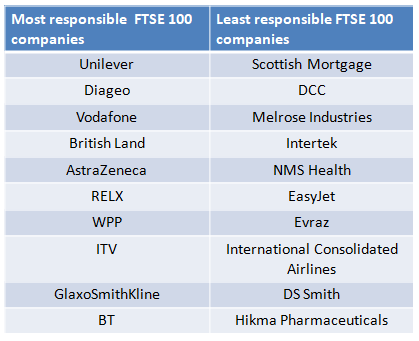Sep
2020
The Good, the Bad and the Ugly: How Really Committed are FTSE 100 Companies to ESG?
DIY Investor
9 September 2020
‘Environmental, Social and Governance’ considerations seem to be fashionably front and centre when it comes down to corporate PR and investment credentials; many companies talk a good game when it comes to sustainability and climate change, but how many of them are genuinely committed once the spotlight is turned off?
Now a survey from research platform Tortoise Media has revealed that some of London’s 100 largest companies do a lot more than others.
Its research ranked all companies in the FTSE 100 index against the UN’s Sustainable Development Goals, and created a ‘responsibility index’, measuring the gap between what companies say and what they do, highlighting the range of corporate commitment to people and the planet.
A perennial favourite with sustainability-focused investors, few will be surprised to learn that consumer goods giant Unilever (ULVR) came out on top; Tortoise pointed to a near 50/50 gender split at senior management level, the fact it sends zero waste to landfill in the top 21 countries it operates in and that it has the lowest levels of energy consumption per employee among firms in the index.
‘‘responsibility index’, measuring the gap between what companies say and what they do’
At the other end of the scale, Scottish Mortgage Investment Trust (SMT), doesn’t use any environmental, social or governance (ESG) criteria and ranks low on sustainability according to Morningstar; however, it does hold stocks like electric vehicle makers Tesla and Nio and scores well when it comes to the carbon emissions produced by the companies it holds.
Tortoise identified software supplier Sage (SGE) is the most ‘humble’ company in the responsibility index; in the top 10 after taking strong action to advance social responsibility, yet in the bottom 10 for talking about it.
Melrose Industries (MRO) ranked badly for being the least transparent; the company failed to report on more than two thirds of the 10,000-plus data points Tortoise Media looked at when compiling the index, including areas such as employee diversity, training and wellbeing.
In announcing its findings, Alexandra Mousavizadeh, partner at Tortoise Intelligence, called for FTSE 100 firms to start a ‘race to the top’, saying:
‘The appetite from consumers, clients and shareholders for irresponsible corporate behaviour is diminishing. It is two minutes to midnight and we need this index to identify the gap between PR talk and real action.’
‘we need this index to identify the gap between PR talk and real action’
The research found that 3.1m FTSE 100 employees, out of 4.8m in total, work for companies who haven’t committed to paying the UK Living Wage of £9.30 an hour; FTSE 100 companies emitted 419m tonnes of CO₂ in 2018, 55m tonnes more than produced by the entire UK, with nearly a third having an increasing carbon footprint.
Just Giving
The FTSE 100 contributes almost £1.8bn in charitable and community investments a year, six times higher than Oxfam’s annual spending; however, this equates to just £1.39 on average for every £1,000 earned.
Broadcaster ITV (ITV) is the most generous company in the FTSE 100, donating £13.94 for every £1,000 of its revenue; next highest is wealth management business St. James’s Place (STJ) at £8.15.
The companies with the biggest chasm between their ‘talk and walk’ on all things ESG are miner Glencore (GLEN), oil and gas giant Royal Dutch Shell (RDSB) and packaging firm Mondi (MNDI).
‘ESG storms the CFO’s office, elbowing its way onto the bottom line’
By sector, Tesco (TSCO) was the highest ranked supermarket thanks to its ‘rigorous’ approach to responsibility reporting and action taken on staff training and poverty; they were followed by Sainsburys, Morrisons and Ocado.
Lloyds (LLOY) was top of the banks for its climate performance; in the energy and extractive industries utility provider SSE (SSE) was best ranked as it had the lowest emission per employee.
Burberry (BRBY) topped the fashion sector, despite burning millions of pounds worth of unsold clothes to protect its brand, because it obtained 58% of its energy from renewable sources in 2018/19; following on were Next and JD Sports.
Ranked highest in big pharma was AstraZeneca (AZN), due in no small part to its relatively high representation of women (44%) at senior management level.
In travel and leisure, InterContinental Hotels (IHG) was top thanks to its ‘thorough reporting’ on environmental measures, including composting, and it made the largest improvement in the index when it comes to emissions intensity.
Greater Focus on ESG
The responsibility index followed on from an ESG report by index provider MSCI, which found that trends for 2020 include investors using alternative data to spot companies taking the lead on climate change; it also foresees that ‘ESG storms the CFO’s office, elbowing its way onto the bottom line as financiers get creative with ways to bind ESG criteria to their terms of capital, introducing a plethora of corporate borrowers into the wide world of ESG.’
MSCI said it believes that in the property sector, reckons ‘greening the property portfolio’ will move from a nice-to-have reputation booster to an imperative in the face of a looming ‘brown discount’ if real estate investors don’t kick-start their journey to zero carbon.
To see the methodology and full report click:
Login to my EQi account Open an EQi account


Leave a Reply
You must be logged in to post a comment.